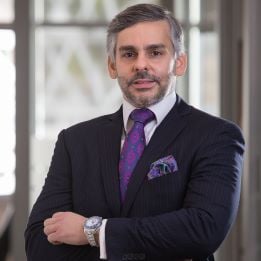

General counsel | InterEnergy Group



Marcos Ortega Fernández
General counsel | InterEnergy Group
What are the most significant cases, projects and/or transactions that you and/or your legal team have recently been involved in?
Over the past year, our team has played a decisive role in advancing InterEnergy Group’s regional strategy through several high-impact transactions. We are currently supporting the group’s expansion by providing legal advice on strategic projects such as compressed natural gas (CNG) and liquefied natural gas (LNG) terminals, wind and solar farms, battery energy storage systems (BESS), as well as mergers and acquisitions, corporate restructuring, and the negotiation of power purchase agreements (PPAs) in emerging markets.
We also provide support in financing operations with multilateral, local, and international banks, securities market issuances, and in the structuring, contribution, and legal oversight of landmark projects in the Dominican Republic, Guyana, Puerto Rico, and other Caribbean countries. These efforts demonstrate our team’s ability to balance legal risk with strategic opportunity, acting not only as legal advisers but as strategic partners aligned with the group’s growth agenda.
How do you approach managing legal aspects during periods of instability or crisis to ensure the organization’s resilience?
I currently have over 23 years of experience in the sector, and during this time I have learned that selecting collaborators who provide support and contribute across different areas makes a significant difference in the quality of work delivered. In this regard, I believe it is crucial to prioritise teamwork to ensure efficiency and timely results.
I also consider the involvement of external lawyers especially valuable, as they bring specialised expertise and an objective perspective on specific cases, offering a complementary approach that helps mitigate risks more effectively and strengthens our ability to respond to complex or urgent situations. By dividing and assigning tasks, we can gain different perspectives and manage crises appropriately.
When handling crises, we ensure the team is coordinated and that each member’s strengths are fully utilised. This collaborative approach allows us to tackle challenges from multiple angles and ensures we can respond quickly and effectively. Maintaining open communication and fostering a supportive environment are also essential to overcoming crises and ensuring organisational resilience.
What strategies do you employ to ensure the successful digital transformation of a legal department while maintaining compliance with your country’s data protection laws?
Digital transformation goes beyond simply adopting new tools; it involves fostering a mindset shift within the team. We have implemented Juro as our contract lifecycle management system, enabling us to integrate AI to streamline workflows and move into the final phase of enabling digital formalisation for the majority of contractual documents.
Additionally, we have been at the forefront of designing new business models, such as cross-border energy initiatives, addressing issues including property rights and regulatory gaps. By asking the right questions from the outset, we ensure that our legal team is involved in the innovation process from the very beginning.
Based on your experiences in the past year, are there any trends in the legal or business world that you are keeping an eye on that you think other in-house lawyers should be mindful of?
First, the digitalisation and automation of processes is a trend that, as in-house lawyers, we have a responsibility to promote. We must lead the transition to more efficient, secure, and sustainable environments by taking full advantage of available technological advances.
Digital signatures are also an important consideration. This tool not only optimises time and resources but also reduces the need for printing and the environmental impact of physical documents. It eliminates the requirement to maintain physical files, freeing office space and improving both agility and information security. By anticipating these trends, we can ensure that our legal department is not only more efficient but also environmentally conscious and better prepared for the future.
What factors influence your team’s decision to use external legal services versus handling matters in-house, and what criteria are used to evaluate their performance?
Our decision to engage external counsel is strategic, not transactional. We assess the complexity, risk, and jurisdictional scope of each matter. For high-risk or highly specialised issues – such as international financing or arbitration – we partner with external firms with whom we maintain long-term relationships. For operational or regulatory matters, we rely on our in-house expertise, which is closely integrated with the business. In this regard, we maintain a team with extensive experience, full dedication, and solid knowledge. We value those who act as true partners, not just advisers.
Legal director | InterEnergy Group